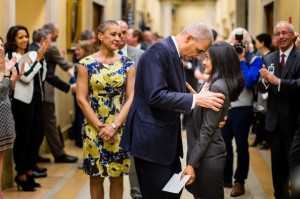“You Can Legally Bribe a Government Official”

Janine Jackson interviewed investigative reporter Lee Fang about Washington’s revolving door for the July 24 CounterSpin. This is a lightly edited transcript.
Janine Jackson: When Eric Holder first joined law firm Covington & Burling in 2001, he was coming from a stint as deputy attorney general under Bill Clinton. So it’s no wonder that when Holder went to the Obama administration as attorney general, the folks at Covington kept his seat warm.
And indeed, for many, Holder’s seamless slide from theoretically prosecuting big banks to defending big banks from prosecution is a common-sense phenomenon only the hopelessly naïve would bother to decry. He’s a lawyer, what do you expect? was the substance of many a comment –of what comment there was, because, again, this latest glimpse of the porous tissue between regulator and regulated went down as no news at all for most of the press.
Our next guest does find that revolving door newsworthy. Investigative journalist Lee Fang has been talking about money and politics for years; he’s a co-founder of RepublicReport.org and writes at The Nation as well as The Intercept. He joins us by phone from the Bay Area.
Welcome back to CounterSpin, Lee Fang.
Lee Fang: Hey, Janine. Thank you so much for having me.
JJ: Well, tell us first, if you would, a little bit about Covington & Burling. Who are they and who are some of their clients?
LF: Covington & Burling is a Washington, DC, law firm that also engages in lobbying; it’s got an extensive practice that hires former members of Congress, their staff, former federal officials—including of course, Eric Holder—and it represents major corporations. So the firm has helped negotiate settlements for corporations that have been accused of wrongdoing, they’ve also helped secure legislation for their corporate clients and they’ve done a number of regulatory and lobbying acts that help provide their clients with special access to politicians.
JJ: And some of those clients have included some of the largest banks.
LF: Yeah, that’s right. You know, a few years ago, Reuters had a great investigation that showed that Covington & Burling has not only represented the big banks—Bank of America, CitiGroup, JP Morgan, Wells Fargo—but they played a really special role in the foreclosure crisis, helping these banks set up a mortgage company that helped create a document trail. When banks have attempted to foreclose on companies and they have to produce these documents showing that they have a chain of title, then this third party company, known as MERS, produced these documents, in many cases falsified these documents, and Covington’s role, actually, in the late ’90s—they provided the legal documentation to create MERS on behalf of Fannie Mae and Freddie Mac.

The New York Times depicts Eric Holder’s departure from the Justice Department. (photo: Zach Gibson/NYT)
JJ: Well, in thumbnailing Holder’s tenure as attorney general, folks like the New York Times said, “His Justice Department wrested huge fines from banks, including JP Morgan Chase, Barclays and CitiGroup,” but seen another way, Holder by some lights didn’t so much try and fail to prosecute big banks as succeed in protecting them.
LF: That’s right. As the inspector general of the Justice Department found, under Holder the Justice Department actually deprioritized mortgage fraud in their US attorney offices in New York, California and elsewhere. So there was a systemic attempt to shift the blame for the mortgage and financial crisis in 2008. Instead of the big banks, there were only criminal prosecutions of some small-time lenders and mortgage professionals, but the big banks that really had the responsibility behind the financial crisis, there was no effort to make any criminal referrals that we know of publicly and, of course, there were no prosecutions of any of the large banks responsible for the crisis.
JJ: Well, when you talk about Eric Holder going from Covington & Burling to the White House back to Covington & Burling back to the White House back to Covington & Burling, the response from many could be summed up, I think, as “duh.” I mean, some of us don’t forget 1992 Hillary Clinton saying, “For goodness sakes, you can’t be a lawyer if you don’t represent banks.”
And the idea is kind of: This is just how the game is played, what’s your problem?
For me, it’s not as if we’re asking reporters to feign surprise or feign ingenuousness, but you can’t present just kind of winking at the cynicism of it all as though that meant the same as interrogating it, or explaining who is hurt and who is helped. Obviously, real people are involved here.
LF: That right. I think this is not just a scandal for the Justice Department in that so many of the officials, not just Holder, but his top deputy Lanny Breuer also returned to Covington & Burling after serving for a few years in the Obama administration—this is a scandal for the media.
One of the perhaps most cynical and and most prevalent ways that you can legally bribe a government official or an elected official is to wait to give them a multi-million dollar check, not while they’re in office, but as soon as they retire. So if a politician helps a bank or an oil company, that oil company can’t directly buy them a boat or give them a million-dollar check. But if they wait until that official retires from office, as soon as they step out the door of Congress and find an employment contract with a lobbying firm or a big bank, then they can accept a multi-million-dollar payday; and so it’s simply delayed bribery, in my perspective.
But because this has become so routine, that this happens every day, whether it’s a member of Congress or a high level regulator, or in this case, the head of the Justice Department, this has become such a function of life in Washington, DC, it’s no longer a scandal in the eyes of many reporters. In a sense they condone this behavior, because in some of the exit interviews that Holder gave, reporters who had that special access to Eric Holder, they didn’t ask him about this dynamic, they didn’t ask him how much he’s being paid, they didn’t ask him about the ethics issues of going back to work for a big bank lobbying firm given his role in refusing to criminally prosecute these banks. You know the onus lies on the reporters and the media outlets that fail to ask these questions.
JJ: I almost feel as though it’s a sign of savvy to show that you’re not outraged, that you’re not disturbed at this sort of shenanigan, you know? That’s kinda what makes you a “serious” reporter in some ways. Which is disheartening.
LF: Sure, it’s part of the dynamic of being a beat reporter that if you ask these kind of unflattering questions, you lose access, you get shuffled around. So to be a successful beat reporter, you have to ask only tangential questions, or questions that make the interviewee—cast them in a positive light, I suppose.

A lobbyist for Pepsi is now chief of staff of the Senate Agricultural Committee, which oversees school lunch programs and nutritional guidelines.
JJ: And just so folks know that we’re not using Holder as an example because he’s so rare, this kind of porousness happens at all levels. For example, before you were writing about Holder, you were writing about this guy Stephen Sayle from Chevron and his new job.
LF: That’s right. A top lobbyist for Chevron, Stephen Sayle is now a senior staff member for the House Committee on Science, which oversees science policy for the federal government. This is a lobbyist, Mr. Sayle, who has helped Chevron beat back regulatory efforts that rest on federal science, whether it’s on the ozone or on climate change.
And now that he is overseeing the Science Committee, he has a unique opportunity to shift not only policy that governs the way that federal science is used to implement pollution regulations, he also has an opportunity to help with the Science Committee’s kind of investigation of climate scientists: Over the years, the House Science Committee has brought in various scientists to quiz them on climate science and other issues that are very controversial now given the EPA’s pursuit of regulations that affect the fossil fuel industry.
But that isn’t a unique dynamic. In the last two Congresses, we’ve seen an unprecedented wholesale change in the senior staff positions in Congress, and I’m referring to the chief of staff, which reports directly to a member of Congress or senator, or the staff director position, and that’s the position that oversees either a committee or a subcommittee. In almost every single position for staff director, we’ve seen lobbyists for the relevant industry take those spots.
So for the Agricultural Committee, which oversees school lunches and nutrition guidelines, we now have a Pepsi lobbyist who is overseeing that committee. In the Senate Armed Services Committee, which oversees military spending, we have a lobbyist for the trade group that represents Lockheed Martin and Boeing now leading that committee. So from committee to committee, whether it’s on chemical safety, whether it’s on pollution or on school lunches, we have lobbyists for the industries affected now running the show from the inside.
JJ: It certainly sounds like a story to me, but it’s not if you think it’s just business as usual.
LF: Certainly, and this gets back to the culture of Washington, DC. If you work in the public interest, if you kind of sacrifice your career to helping the public good, working at a small think tank or at an academic research position or in a public interest organization, you’re kind of seen as a loser. You’re not invited to the big parties, you’re not featured in the glossy magazines. But if you’re a political player, the big media outlets celebrate you; you’re kind of seen as a winner in the big social circles in Washington, DC. And as a kind of side effect of this entire dynamic, when you take these positions, whether it’s with Chevron or with another company, and then move into positions of power, your friends in the media do not consider this a scandal.
JJ: We’ve been speaking with journalist Lee Fang; his recent article on Eric Holder appeared on The Intercept. You can find them online atFirstLook.org. Lee Fang, thank you very much for joining us this week onCounterSpin
LF: Janine, it was a pleasure. Thank you so much for having me.


